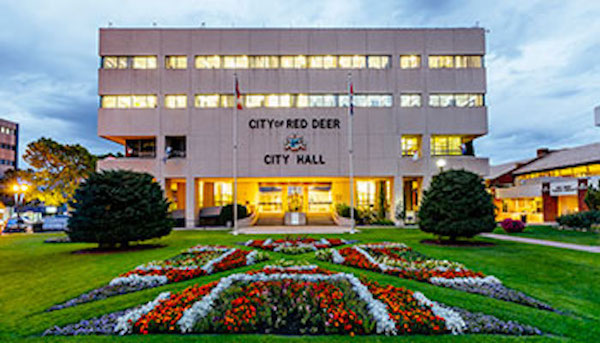City of Red Deer
City to consider surplus land and buildings for affordable housing

City Council approves housing asset development recommendations
At their regular meeting Monday, City Council unanimously supported ten recommendations related to municipal government enabling actions that reflect the Community Housing and Homelessness Integrated Plan (CHHIP). Administration also presented an action plan for pursuing all ten enablers within the next three years, including some that will be actioned immediately. The enabling actions were researched and analyzed extensively to provide optimized solutions for The City in relation to their impact in leveraging funds from other orders of government, as well as the difficulty and timeframe for implementation.
The recommendations are in response to a City Council motion from January 2022 directing The City’s Housing and Homelessness Integration Committee (HHIC) to expedite permanent supportive housing asset development and to explore and identify related funding and government enabling actions. On February 6, 2023, Council directed administration to prioritize zoning and permitting processes for affordable housing and permanent supportive housing applications, specific to applications seeking Canadian Mortgage and Housing Corporation’s Rapid Housing Initiative and Government of Alberta’s Affordable Housing Partnership funding.
Supported by case studies that demonstrate successful strategies used by other municipalities to incentivize and increase affordable and supportive housing stock, the approved recommendations provide the following direction:
• Surplus land: Administration will present a report to Council in late 2024 that contains a list of potentially suitable surplus lands or buildings that The City may consider using for affordable housing. A report containing a list of potentially suitable surplus lands or buildings that The City may consider using for affordable housing.
• Financial incentives: A tax supported financial incentives program will be presented in November 2023 for Council consideration during mid-cycle budget review. Additionally, Administration will explore The City’s application for the new “Housing Accelerator Fund” through the Canadian Mortgage & Housing Corporation.
• Property tax exemptions: To ensure equitable and transparent implementation for non-Alberta Social Housing Corporation properties that provide affordable housing, a grant program in lieu of property tax exemptions will be presented in November 2024 as part of the next budget debate.
• Land designations: A full business case regarding land designation outlining financial feasibility and risks to The City’s Land Bank will be presented to Council in late 2024.
• Fast track development: Administration will prioritize zoning and permitting processes for affordable housing and permanent supportive housing applications as an immediate, long-term measure, specific to applications seeking funding from other orders of government.
• Waive municipal fees: Administration will ensure municipal fees are eligible expenses in the tax-supported financial incentives program that will be presented to Council in November 2023 as part of mid-cycle budget review.
The resolutions also endorse the following administrative actions:
• Provision of continued support to potential applicants to federal, provincial and municipal affordable housing programs.
• Development of key messages supporting The City’s advocacy for increased affordable housing stock.
• Development of new Land Use Bylaw for Council consideration in 2023.
• Exploration of conversion of commercial buildings for timeliness and affordability reasons..
“In addition to reflecting the Community Housing and Homelessness Integrated Plan (CHHIP), the approved enabling actions are the result of community input, local context, and promising practices and we expect them to make an impact towards our community’s housing affordable housing and permanent supportive housing goals,” said Ryan Veldkamp, Social Wellness & Integration Supports Superintendent.
More information on Housing & Homelessness efforts can be found at: https://www.reddeer.ca/about-red-deer/social-well-being-and-community-initiatives/housing-and-homelessness/.
City of Red Deer
City of Red Deer Employee Honoured with Bob Stollings Memorial Award for Outstanding Contributions

Annette Scheper, Community & Program Facilitator in the Safe & Healthy Communities Department is The City’s 2025 recipient of the Bob Stollings Memorial Award.
The Bob Stollings Memorial Award is given out each year to a City employee who displays outstanding performance in alignment with The City’s RISE cornerstone values – respect, integrity, service and excellence. Nominations for the award are submitted by fellow coworkers detailing the employee’s achievements professionally and interpersonally, along with letters of support. The award is considered a great honour among City staff.
With an impressive 22-year career, Annette has played a pivotal role in shaping Red Deer’s cultural and special events landscape. Her leadership and innovation have brought thousands of successful events to life, creating lasting traditions that enrich the lives of residents. Her commitment to excellence and resourcefulness has ensured that community initiatives are inclusive, accessible, and impactful.
One of Annette’s most notable achievements is the development of the Community Loan Program, which provides essential resources for local groups, contributing an annual value of $86,778.95 back into the community. In addition, she has successfully led and executed a variety of large-scale events, demonstrating remarkable problem-solving skills and a dedication to sustainability. From creating elaborate event designs with repurposed materials to managing complex logistics, she continuously sets the standard for excellence.
“Annette exemplifies the best of our organization,” said City Manager, Tara Lodewyk. “Her unwavering dedication, innovative thinking, and ability to bring people together has made a profound impact on our city. This award is a testament to her hard work and passion for creating meaningful experiences for our community.”
The Bob Stollings Memorial Award was first established in 1985 and is presented every year to honour Robert (Bob) E. Stollings, a loyal and dedicated City employee from 1960-1984.
City of Red Deer
Red Deer will choose a new Mayor as Ken Johnston decides to step away

It’s a telling detail about the person who leads Red Deer City Council. Always putting the city’s needs ahead of his own, Mayor Ken Johnston has announced his intentions within days of the opening of Nominations for October’s municipal elections,
After 12 years on council, Mayor Ken Johnston has decided against running for a second term as Mayor this fall. Johnson shared his decision in front of colleagues and supporters in a touching announcement on Wednesday.
At 71 years old, Johnston remains vibrant, passionate and healthy. He says that’s exactly why he and his wife Carolyn have decided now is the right time to start their next stage of life together.
Mayor Johnston listed a number of highlights and achievements he can look back on, including his help advocating for the redevelopment of Red Deer Regional Hospital, the growth of Red Deer Polytechnic, and positive moves in Economic Development.
All these lead of a feeling of ease about the decision to step away, though affordable housing and a permanent shelter for the homeless remain pressing concerns.
With about 8 months remaining in his term, Mayor Johnston is planning to push hard to move the needle on these housing issues.
“We’re looking forward to some more work and we’ll be going to the community shortly about it. So I still have optimism that maybe before the term is out we can have an announcement.”
This is the second major political announcement in Central Alberta in the last number of days. Earlier this week Red Deer Mountain View MP Earl Dreeshen announced he won’t be running in the next federal election.
-

 2025 Federal Election2 days ago
2025 Federal Election2 days agoThe Federal Brief That Should Sink Carney
-

 2025 Federal Election2 days ago
2025 Federal Election2 days agoHow Canada’s Mainstream Media Lost the Public Trust
-

 2025 Federal Election2 days ago
2025 Federal Election2 days agoOttawa Confirms China interfering with 2025 federal election: Beijing Seeks to Block Joe Tay’s Election
-

 Media20 hours ago
Media20 hours agoCBC retracts false claims about residential schools after accusing Rebel News of ‘misinformation’
-

 2025 Federal Election2 days ago
2025 Federal Election2 days agoReal Homes vs. Modular Shoeboxes: The Housing Battle Between Poilievre and Carney
-

 COVID-192 days ago
COVID-192 days agoNearly Half of “COVID-19 Deaths” Were Not Due to COVID-19 – Scientific Reports Journal
-

 John Stossel2 days ago
John Stossel2 days agoClimate Change Myths Part 2: Wildfires, Drought, Rising Sea Level, and Coral Reefs
-

 Bjorn Lomborg19 hours ago
Bjorn Lomborg19 hours agoNet zero’s cost-benefit ratio is CRAZY high

